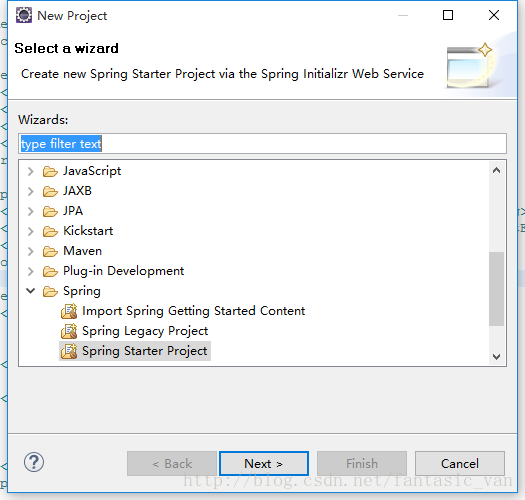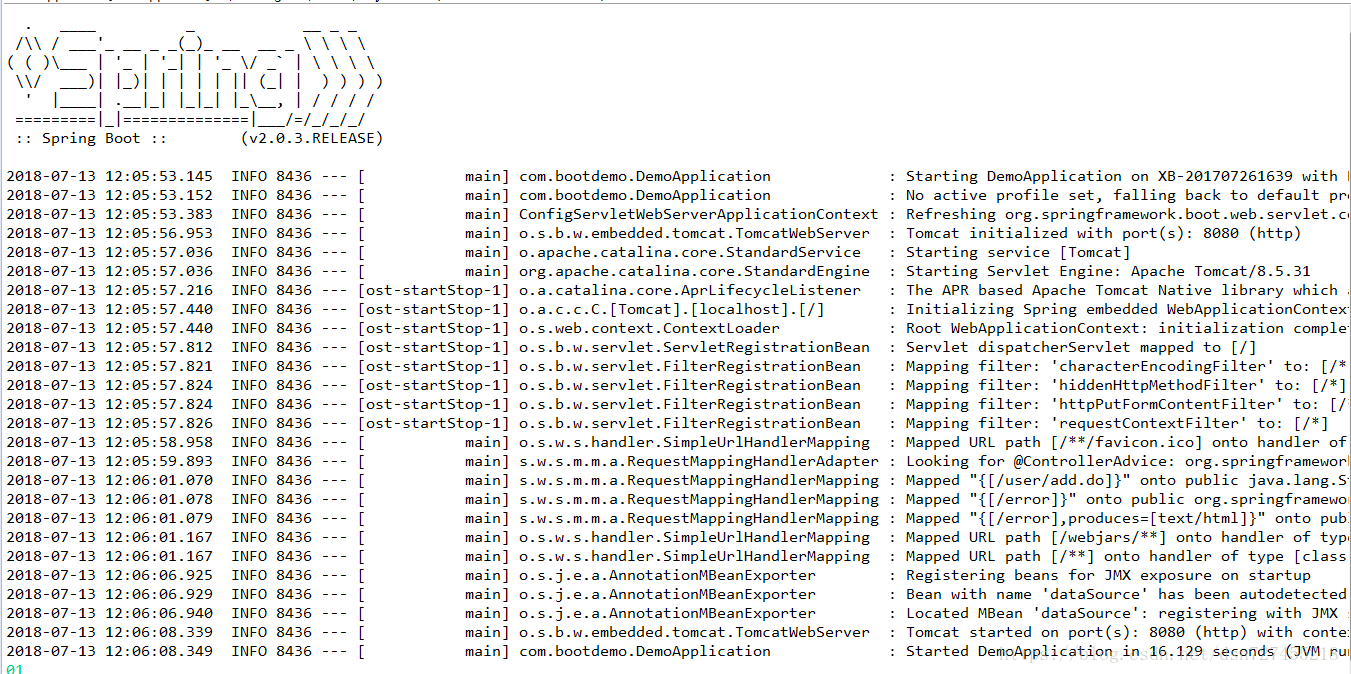喜欢的朋友可以关注下,粉丝也缺。
自从Spring推出Boot,Cloud系列之后,一度成为热门的框架,现在大部分的招聘要求都要有相关的开发经验,借此我在这里就给大家分享一下如何玩转SpringBoot跟Mybatis。
这里我给大家提供我创建的demo下载地址
https://download.csdn.net/download/dsn727455218/10539629
在这里就不跟大家说废话,我们实际操作一番。
使用工具:
eclipse 版本随意
jdk 环境
mysql 数据库
这个工具的安装使用我就不给大家介绍,相信你们都能完成。
SpringBoot项目创建的方式:
1.访问 http://start.spring.io/
这个是最为简单的 输入项目名,包名,以及项目类型后,版本现在基本都是2.0+,下载导入到开发工具即可

2.Spring Boot CLI cmd命令操作
下载安装配置环境我就不多做介绍,很简单的操作这不是我介绍的重点
3.利用eclipse来创建SpringBoot 这才是我介绍的重点
首先我们需要在eclipse上面集成STS,至于这是什么,自己可以去Sping的官网看介绍。
eclipse安装:
Help -> Eclipse Marketplace…
Search或选择“Popular”标签,选择Spring Tool Suite (STS) for Eclipse插件,安装
网络不好的可以下载有点慢,慢慢等安装。
new project ,选择spring -> spring starter project

按自己的信息填写,我这里项目名叫demo1
选择版本和组件

我这里选了2.0.3版本,现在基本都是2.0+的版本,选了mysql和web,mybatis,因为是web项目,都会选择web这个选项,其他的可以按自己需要选择,点击 Finish ,就会有一个新项目,不过需要等待几分钟,sts工具会生成spring boot目录的结构及文件
这就是我们最终的结构。
这里需要提示一点如果没有dependencies包,检查一下项目目录下.classpath 里面是否有
<classpathentry kind="con" path="org.eclipse.m2e.MAVEN2_CLASSPATH_CONTAINER"/>
没有就加上,重启eclipse即可,其他原因我就不做多的说明,相信你们能够发现。
接下来我们就来创建包
controller :控制层
dao:数据接口
service:实现类
mapper:这里是放dao层的xml文件 也就是mybatis的
entity:实体类
这几个包是做什么的你们应该能开明白
就是这个样子的
pom.xml 配置文件
这里我只是配置一个基础的,如果需要更加详细的配置文件可以参考我的另一篇文章
https://blog.csdn.net/dsn727455218/article/details/81028192
接下来我们就写写代码try-try
首先我们需要先创建一个userinfo表 字段(id,username,userpass,name)
对应的实体类UserInfo
/** * @author dsn * * @version 创建时间:2018年7月5日 上午11:30:00 */ package com.bootdemo.entity; /** * @author dsn * @version 创建时间:2018年7月5日 上午11:30:00 */ public class UserInfo { /** * @return the id */ public int getId() { return id; } /** * @param id * the id to set */ public void setId(int id) { this.id = id; } /** * @return the username */ public String getUsername() { return username; } /** * @param username * the username to set */ public void setUsername(String username) { this.username = username; } /** * @return the userpass */ public String getUserpass() { return userpass; } /** * @param userpass * the userpass to set */ public void setUserpass(String userpass) { this.userpass = userpass; } /** * @return the name */ public String getName() { return name; } /** * @param name * the name to set */ public void setName(String name) { this.name = name; } private int id; private String username; private String userpass; private String name; }
dao层接口UserInfoMapper 这里我是继承了BaseMapper父类,一些方法是可以共用的
/** * @author dsn * * @version 创建时间:2018年7月5日 上午11:35:10 */ package com.bootdemo.dao; import com.bootdemo.entity.UserInfo; /** * @author dsn * @version 创建时间:2018年7月5日 上午11:35:10 */ public interface UserInfoMapper extends BaseMapper<UserInfo> { //添加单个对象 // public int insert(User entity); }
BaseMapper
package com.bootdemo.dao; import java.util.List; import org.apache.ibatis.annotations.Param; public interface BaseMapper<T> { //添加单个对象 public int insert(T entity); //修改单个对象 public int update(T entity); //删除单个对象 public int delete(T entity); public int deletebyname(T entity); //查询单个对象 public T select(T entity); //查询多个对象 public List<T> query(); //根据分页查询多个对象 public List<T> selectbypage(@Param(value = "pageSize") int pageSize, @Param(value = "currentPage") int currentPage); //根据搜索条件查询 public List<T> searchbytj(@Param(value = "st") String st, @Param(value = "et") String et, @Param(value = "con") String con); //查询总条数 public int selectCount(); }
service层UserInfoService 同样的我继承了BaseService
/** * @author dsn * * @version 创建时间:2018年7月5日 上午11:35:36 */ package com.bootdemo.service; import com.bootdemo.entity.UserInfo; /** * @author dsn * @version 创建时间:2018年7月5日 上午11:35:36 */ public interface UserInfoService extends BaseService<UserInfo> { }
BaseService
package com.bootdemo.service; import java.util.List; import org.apache.ibatis.annotations.Param; public interface BaseService<T> { // 添加单个对象 public int insert(T entity) throws Exception; // 修改单个对象 public int update(T entity) throws Exception; // 删除单个对象 public int delete(T entity) throws Exception; public int deletebyname(T entity); // 查询单个对象 public T select(T entity); //查询多个对象 public List<T> query(); //分页查询多个对象 public List<T> selectbypage(@Param(value = "pageSize") int pageSize, @Param(value = "currentPage") int currentPage); //根据搜索条件查询 public List<T> searchbytj(@Param(value = "st") String st, @Param(value = "et") String et, @Param(value = "con") String con); //查询总条�? public int selectCount(); }
mapper文件UserInfoMapper.xml 这是mybatis的sql
<?xml version="1.0" encoding="UTF-8" ?> <!DOCTYPE mapper PUBLIC "-//mybatis.org//DTD Mapper 3.0//EN" "http://mybatis.org/dtd/mybatis-3-mapper.dtd" > <mapper namespace="com.bootdemo.dao.UserInfoMapper" > <resultMap id="userResultMap" type="com.bootdemo.entity.UserInfo" > <id column="id" property="id" jdbcType="INTEGER" /> <result column="name" property="name" jdbcType="VARCHAR" /> <result column="username" property="username" jdbcType="VARCHAR" /> <result column="userpass" property="userpass" jdbcType="VARCHAR" /> </resultMap> <select id="selectList" parameterType="UserInfo" resultMap="userResultMap"> select id,username,userpass,name from userinfo <where> disable='1' <if test="key!=null"> and ( username = #{key,jdbcType=VARCHAR} or name = #{key,jdbcType=VARCHAR} ) </if> </where> </select> <insert id="insert" parameterType="UserInfo" useGeneratedKeys="true" keyProperty="id"> insert into userinfo(name,username,userpass) values(#{name},#{username},#{userpass}) </insert> </mapper>
controller层UserInfoController
/** * @author dsn * * @version 创建时间:2018年7月12日 下午2:04:58 */ package com.bootdemo.controller; import javax.annotation.Resource; import org.springframework.web.bind.annotation.RequestMapping; import org.springframework.web.bind.annotation.ResponseBody; import org.springframework.web.bind.annotation.RestController; import com.bootdemo.entity.UserInfo; import com.bootdemo.service.UserInfoService; /** * @author dsn * @version 创建时间:2018年7月12日 下午2:04:58 */ @RestController @RequestMapping("user") public class UserInfoController { @Resource public UserInfoService userinfoService; @RequestMapping("/add.do") @ResponseBody public String addUser(UserInfo user, String msg) { System.out.println(user.getUsername()); try { int insert = userinfoService.insert(user); if (insert == 1) { msg = "插入成功"; } else { msg = "插入成功"; } } catch (Exception e) { e.printStackTrace(); } return msg; } }
需要注意的是我们需要在DemoApplication里面添加
扫描映射文件不然启动项目会报错的
同样也可以再mapper接口类里面加@Mapper注解,两者皆可
我们只需要运行DemoApplication文件即可。

成功界面,我们会看到Spring大大的logo
平常我们web项目都是在tomcat等容器里面启动,这里为什么不需要呢,是SpringBoot已经集成了tomcat,所以不需要我们在配置了。
如果有的码友需要看注解的源码那么打开dependencies
一些jdbc等等常用的配置文件信息都可以查看的。
这里我给大家提供我创建的demo下载地址
https://download.csdn.net/download/dsn727455218/10539629
如有需要可以加我Q群【308742428】大家一起讨论技术。
后面会不定时为大家更新文章,敬请期待。
喜欢的朋友可以关注下,粉丝也缺。
如果对你有帮助,请打赏一下!!!







